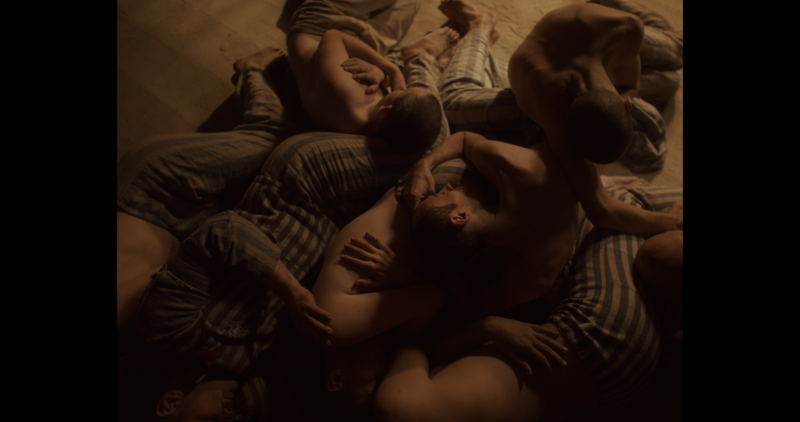
A Story of Hope, Loss, and Uncertainty
MOVIE REVIEW
To the Victory!
–
Genre: Drama, Dystopian
Year Released: 2025
Runtime: 1h 45m
Director(s): Valentyn Vasyanovych
Writer(s): Valentyn Vasyanovych
Cast: Valentyn Vasyanovych, Volodymyr Yatsenko, Marianna Novikova, Vladlen Odudenko, Hryhoriy Naumov, Misha Lubarsky
Where to Watch: shown at the 2025 Toronto International Film Festival
RAVING REVIEW: Valentyn Vasyanovych has built his reputation on quiet yet devastating portraits of Ukraine in crisis, from the haunting near-future visions of ATLANTIS to the clinical, unflinching gaze of REFLECTION. With TO THE VICTORY! he continues this trajectory, shifting from war itself to the space after it ends. The result is a film that resists pride, lingering instead on the emptiness that follows survival.
The premise is simple: a Ukrainian film director, played by Vasyanovych himself, remains in his homeland after the war while his wife and daughter start new lives in Vienna. Isolated, unemployed, and adrift, he clings to the hope that life will stabilize, even as every sign points to stagnation. His conviction that things will “get better, eventually” becomes both his shield and his prison.
Vasyanovych’s choice to center a filmmaker as his protagonist adds a layer of reflexivity. Here is an artist denied the very means of expression that once defined him, reduced to waiting while others move forward. His personal stasis mirrors a national one—a lingering sense of dislocation undercuts Ukraine’s physical victory, as families scatter and the meaning of “rebuilding” remains abstract. The war may be over, but the film insists that the human cost reverberates long after the final shot is fired.
Stylistically, TO THE VICTORY! maintains the director’s trademark style. Long, static takes dominate, often locking the viewer into spaces where silence stretches uncomfortably. Characters are framed at a distance, dwarfed by worlds that feel empty even when populated. The effect is alienating but purposeful; Vasyanovych doesn’t want his audience to feel comforted by resolution, but unsettled by its absence.
At times, this can be frustrating, as it risks testing one's patience. Like his earlier films, TO THE VICTORY! unfolds at a deliberate pace, with long stretches where little appears to happen on the surface. Yet beneath the stillness lies unease—the audience is meant to feel the void that fills the protagonist’s days. For some, the experience may verge on anguish, but for others, it embodies the exact weight of living in the aftermath of war.
Performances reinforce this subdued atmosphere. Vasyanovych himself is not a trained actor, but his presence works precisely because it feels unvarnished. He plays the director as a man perpetually half-absent—physically present in Ukraine but emotionally stuck in a past that no longer exists. Volodymyr Yatsenko and Marianna Novikova, as figures in his fractured world, provide texture, though the film is less interested in interpersonal dynamics than in the quiet devastation of separation.
Thematically, the film is unflinching. Victory, in its title, is presented less as achievement than as irony. What does it mean to win if the price is estrangement from loved ones, a future that feels unreachable, and a daily existence marked by disconnection? Vasyanovych asks whether survival is enough—and whether faith in eventual change is a comfort or a delusion.
As both director and cinematographer, he crafts images that are both aesthetic and stark, featuring ruined buildings framed against indifferent skies. These interiors seem frozen in time, Vienna glimpsed as both aspirational and unreachable. The contrast between settings emphasizes the divide not just between people, but between versions of reality—one defined by waiting, the other by adaptation.
TO THE VICTORY! it isn’t entirely bleak. There are moments where hope flickers, often quietly—gestures of human connection, the persistence of art even in absence. Yet the film refuses to tip into sentimentality. Instead, it sits in ambiguity, capturing the fragile balance between despair and resilience.
As a follow-up to ATLANTIS and REFLECTION, this film feels like the next logical step in Vasyanovych’s ongoing meditation on Ukraine’s present and future. Where ATLANTIS imagined ecological and emotional ruin and REFLECTION captured the brutality of war, TO THE VICTORY! depicts the haunted silence after. It’s a trilogy of sorts, not officially but thematically, with each entry interrogating survival in different registers.
TO THE VICTORY! succeeds in delivering an unsettling but necessary portrait of life after conflict. It may test viewers with its slow pace and refusal to provide catharsis, but that restraint is exactly its point. This is a story about what happens when the fighting ends but the fractures remain, and how victory can feel indistinguishable from loss. For a director who has built his career on seeing the unseeable, it feels like a natural, if painful, continuation.
Please visit https://linktr.ee/overlyhonestr for more reviews.
You can follow me on Letterboxd, Instagram, Twitter, and YouTube. My social media accounts can also be found on most platforms by searching for 'Overly Honest Reviews'.
I’m always happy to hear from my readers; please don't hesitate to say hello or send me any questions about movies.
DISCLAIMER:
At Overly Honest Movie Reviews, we value honesty and transparency. Occasionally, we receive complimentary items for review, including DVDs, Blu-rays, CDs, Vinyl Records, Books, and more. We assure you that these arrangements do not influence our reviews, as we are committed to providing unbiased and sincere evaluations. We aim to help you make informed entertainment choices regardless of our relationship with distributors or producers.
Amazon Affiliate Links:
Additionally, this site contains Amazon affiliate links. If you purchase through these links, we may receive a commission. This affiliate arrangement does not affect our commitment to honest reviews and helps support our site. We appreciate your trust and support in navigating these links.



Average Rating